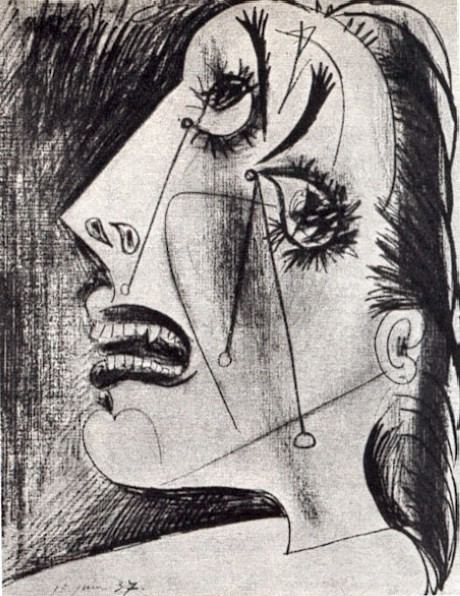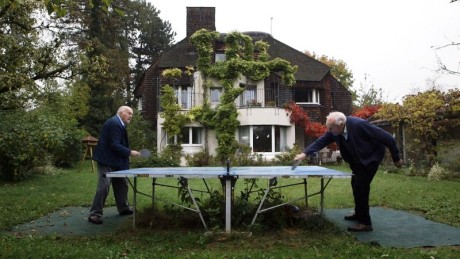”… Mograbi is exactly as his films are: tense, sometimes comic, but always dealing with the embarrassing reality of the country he lives in. A frustrated artist, as he says himself, who wants to move something, raise a debate in Israel, but does not succeed, he is met with total silence, no reactions, whereas he now is an estimated artist in Western Europe!”
AVI MOGRABI – COLLECTED POSTS ON HIS WORKS
By Tue Steen Müller
Z32 (2008)
DocLisboa Diary: … Well, I saw two films yesterday… the heartbreaking observational Kim Longinotto doc ”Hold me Tight, Let me go”, what a brilliant filmmaker and fine person she is, and Avi Mograbi´s ”Z32”, a mise-en-scène film that once again shows how clever this controversial filmmaker is, in finding new ways of dealing with strong themes of the world. This time in a Brechtian musical form. (Blogppost 17-10-2008)
DocLisboa Diary: … I went directly to the videothèque to watch films from the international competition programme to prepare my article for the DOX magazine. It was a long journey through the misery of this world filmed and conveyed by committed and sometimes narratively involved directors and cameramen and –women. Made by English (”All White in Barking” by Marc Isaacs), French-Iranian (”The Faces on the Wall” by Bijan Anquetil and Paul Costes), Chinese (”The Red Race” by Chao Gan) and Israeli (”Six Floors to Hell” by Jonathan Ben Efrat). To mention the four films that impressed me mostly. Themes: xenophobia and loss of identity, the forgotten martyrs, children paced to served the state and inhumanity in the state of Israel.
In all these films there were a lot of emotions. They want us to cry or at least be moved at this festival. And think, even if nothing compares to the opening film by Avi Mograbi in that respect. And in terms of stylistical innovation, Mograbi also has no competitors so far. Classical documentary approach, yes, but on the other hand I have not yet seen a film that I thought should have stayed at home. (Blogpost 18-10-2008)
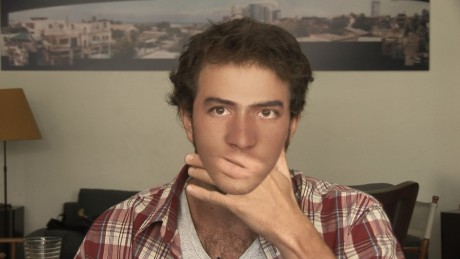
Z32
DOK Leipzig Diary: … I have previously – in my diaries from DocLisboa – mentioned the new masterpiece by Avi Mograbi, ”Z32”. It was also shown at DOK Leipzig, Avi Mograbi was there and I told him again, as in Lisbon, that his films divide people, for which reason he will never get a prize in a documentary festival, as juries tend to go for compromises. Right I was, no prize for Mograbi in Leipzig.
One of the reasons could be found in the review of the film from the Leipziger Volkszeitung, November 1st, written by Norbert Wehrstedt, who, as many others, objects to having talking faces in documentaries… he had hoped that this narrative element had died long time ago. He reduces thus the film to be a ”Hörbuch mit Bildern” that nobody needs. Words, words, words to put it in another words.
I totally disagree to this classical rejection of talking faces. It depends on who is talking, on camera angle, light, rythm and reason for using talking faces. What Avi Mograbi does, is that he innovates the documentary language by using talking masks, as his main character, the killing Israeli soldier, does not want to face the camera. Very intelligent trick that combined with his Brechtian musical element, himself singing comments to the soldier’s crime, makes the film into a universal essayistic wish for reflection.
”Z32” runs in festivals all over, look out for it and if you are in Copenhagen, you can reach it at cph:dox. (Blogpost 03-11-2008 )
A MASTER CLASS, A MASTER’S CLASS
DOCSBarcelona Diary: … Israeli director Avi Mograbi had two screenings of his latest film, ”Z32”, a film that I have praised several times on filmkommentaren.dk
On top of that the director performed a three hour masterclass for 180 people according to this concept: a director chooses 7 clips from his films, clips that he has something special to say about. Mograbi went through a substantial part of his work, and made comments that were all an investigation into the position of the filmmaker towards his character(s). From humourous situations like the one where he has eye contact with Sharon in ”How I learned to overcome my fear and love Ariel Sharon” to his confrontation with the Israeli soldiers, who will not allow Palestinian children to pass a fence and go home from school, in ”Avenge but one of my two Eyes”, to his Brechtian choice of singing his reflections in ”Z32”: ”Am I housing a murderer in my film”?
A masterclass, a master’s class, Mograbi is exactly as his films are: tense, sometimes comic, but always dealing with the embarrassing reality of the country he lives in. A frustrated artist, as he says himself, who wants to move something, raise a debate in Israel, but does not succeed, he is met with total silence, no reactions, whereas he now is an estimated artist in Western Europe! In the next issue of Cahiers du Cinema, the headline is characterising him as ”Le Grand sculpteur de notre temps”. ”Z32” will be released in French cinemas in this month. (Blogpost 06-02-2009)
JACQUES MANDELBAUM’S REVIEW
I have written several times about the new film of Avi Mograbi, and about this very important documentary filmmaker. I do it with pleasure again by quoting the review of renowned critique Jacques Mandelbaum, just published in connection with the theatrical release of the film in France. The quotes are from the beginning and the end of the text that can be read on the site of le monde:
”Voici maintenant vingt ans qu’Avi Mograbi bricole dans son coin de terre promise des films bizarres et inclassables. Ils tiennent à la fois du documentaire, de la fiction, du journal intime, de la farce brechtienne. Voici vingt ans que cet Israélien moyen, violemment opposé à la politique de son pays, s’estime personnellement comptable de l’impasse douloureuse dans laquelle l’Etat dont il est le citoyen a contribué à enfermer la région. Contre cela, il invente des dispositifs aussi subtils qu’extravagants, tient la chronique de sa vie domestique, met le feu aux check-points, mouline l’air de ses imprécations. En un mot, il boxe, avec sa caméra pour arme, jetant à chaque fois son corps de clown triste poids lourd dans un ring régulièrement déserté par l’adversaire…”
” …On l’aura compris, les questions cinématographiques que pose Z 32 sont des questions politiques. Elles évoquent notre manière de nous comporter devant le mal, celui que l’on commet comme celui que l’on subit, et la difficulté d’accéder au pardon. Autant dire que l’humanisme brûlant de ce film porte un des plus forts témoignages jamais filmés sur la nature du conflit israélo-palestinien.” (Blogpost 18-02-2009)
***
ONCE I ENTERED A GARDEN (2013)
The new films of two contemporary film artists who have always gone non-mainstream with their own voice and approach. The films of Liechti and Mograbi can be watched on DocAlliance, that has picked them from the Visions du Réel section ”Etat dEsprit”. ”Father’s Garden – The Love of My Parents” is the film of Liechti (”Sound of Insects”), the description from DocAlliance: After a long absence, Peter Liechti visits his now elderly parents, ready for a close encounter. The stories of their lives and rather difficult marriage are largely presented as a puppet theatre, with the parents, from the lower middle-class, portrayed as hares wearing shirts and aprons. Via the “Punch” character, the rebellious son channels the emotions that overwhelm him in this stunning portrait.
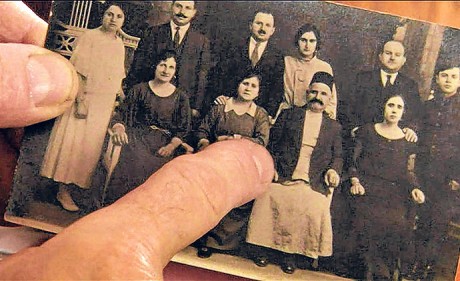
Once I entered a Garden
The film of Avi Mograbi is called ”Once I entered a Garden” and has this text: Avi Mograbi and his long-time friend Ali embark on a journey to a land that existed before borders were created. A world that existed, even though most of the people and especially politicians pretend it never did. A world where communities were not divided along religious lines. With a light hand held camera, Mograbi continues to question the history of Israel. Everything is still possible. Last feature documentary film of Mograbi was ”Z32”, a masterpiece. (Blogpost 30-04-2013)
AN IMPORTANT PS
On Copenhagen Jewish Flm Festival 2014: … There is a good climate for documentaries in Israel. Broadcasters invest more in the genre than you experience in Western Europe, there is public funding and private funds, there are film schools, the festival DocAviv and the unique CoPro, headed by Orna Yarmut, a marketing tool for Israeli documentaries abroad. I was for years involved in the selection of projects to the yearly CoPro pitching forum in Tel Aviv, where films on the development stage are presented to potential buyers from television stations and funds from all over the world.
Several film projects that took part in CoPro sessions are now finished films and can be watched at the Jewish Film Festival in Copenhagen at the Cinemateket January 9-12. Feature films and documentaries are presented with an absolute majority of the latter. Let me recommend some of them:
”Life in Stills” by Tamar Tal is a wonderful, very funny and warm film with a 96 year old grandmother and her grandson, who keeps a photo shop alive in Tel Aviv (closed now, I am afraid). The scoop photos are from the declaration of independence of the state of Israel but the film is first and foremost about the relationship between the two.
”One Day in Peace” by Erez and Mira Laufer, a film that has been touring festivals all over the world, and been subject to endless important discussions. Here is the text about the film taken from its official website: ”Can the means used to resolve the conflict in South Africa be applied to the Palestinian-Israeli conflict? As someone who experienced both conflicts firsthand, Robi Damelin wonders about this. Born in South Africa during the apartheid era, she later lost her son, who was serving with the Israeli Army reserve in the Occupied Territories. At first she attempted to initiate a dialogue with the Palestinian who killed her child. When her overtures were rejected, she embarked on a journey back to South Africa to learn more about the country’s Truth and Reconciliation Committee’s efforts in overcoming years of enmity. Robi’s thought-provoking journey leads from a place of deep personal pain to a belief that a better future is possible. Robi Damelin will be present at the screening in Copenhagen.”
The charismatic producer Arik Bernstein told me about his for years ongoing project collecting home movie footage from private citizens. The film is screened in Copenhagen and I am curious to see the final result – ”Israel: A Home Movie”, director Eliav Lilti – for sure far from the usual propaganda from the official political Israel.
The – for many – father of Israeli documentary David Perlov (from the site about him: ”The documentary cinema interests me only if I can turn it into something more poetic. Only then does cinema interest me”) is represented with the 1979 ”Memories of the Eichmann Trial”. The description of the film from the Israelfilmcenter’s site: Layers upon layers of memory are laid down in Perlov’s fillm, a unique historical and cinematic document. In interviews that Perlov conducted in his apartment seventeen years after the trial of the notorious Nazi mastermind Adolf Eichmann, survivors, their children and young Israelis all give their perspectives on the impact the trial had on Israeli society’s approach to the Holocaust and its survivors, as well as the manner in which it influences their personal and familial lives.
And of course there is Dror Moreh’s Oscar nominated ”Gatekeepers” the choice of Cinemateket as ”documentary of the month”. One of the gatekeepers, former ambassador to Denmark Carmi Gillon, will be present at one of the screenings. The film has been reviewed on this website.
PS
A request to the programmers of Cinemateket: Please show on some occasion the latest film by Avi Mograbi, ”Once I Entered a Garden”, a great film by the most important Israeli documentarian, probably too controversial for a Jewish Film Festival. Here is the precise description the film had when showed at the Edinburgh International Film Festival this year: A wry, playful reflection on the emotional consequences of a political situation, centred around a revealing series of intimate conversations between the Israeli filmmaker and his Palestinian ex-Arabic teacher and longtime friend. An exchange of shared and separate histories, perfectly underscored by and intercut with achingly beautiful letters to a love lost across the divide, read by a woman over evocative super 8 footage of modern-day Beirut. (Blogpost 04-01-2014)
***
IN PARIS 2015
The French love the Israeli film artist Avi Mograbi – and do so this film blogger, who has followed his carreer with great enthusiasm. From March 14 the prestigious museum Jeu de Paume has invited Mograbi to meet the audience, discuss art and politics, and show his works, oeuvre, to stay in the French cultural context. A well deserved hommage! A couple of quotations from this site:
”…he innovates the documentary language by using talking masks, as his main character, the killing Israeli soldier, does not want to face the camera. Very intelligent trick that combined with his Brechtian musical element, himself singing comments to the soldier’s crime, makes the film into a universal essayistic wish for reflection…” (about Z32)
”…A masterclass, a master’s class, Mograbi is exactly as his films are: tense, sometimes comic, but always dealing with the embarrassing reality of the country he lives in. A frustrated artist, as he says himself, who wants to move something, raise a debate in Israel, but does not succeed, he is met with total silence, no reactions, whereas he now is an estimated artist in Western Europe! In the next issue of Cahiers du Cinema, the headline is characterising him as ’Le Grand sculpteur de notre temps’ ”. (DocsBarcelona, masterclass with Avi Mograbi)
And in French, from le Monde: ”Voici maintenant vingt ans qu’Avi Mograbi bricole dans son coin de terre promise des films bizarres et inclassables. Ils tiennent à la fois du documentaire, de la fiction, du journal intime, de la farce brechtienne. Voici vingt ans que cet Israélien moyen, violemment opposé à la politique de son pays, s’estime personnellement comptable de l’impasse douloureuse dans laquelle l’Etat dont il est le citoyen a contribué à enfermer la région. Contre cela, il invente des dispositifs aussi subtils qu’extravagants, tient la chronique de sa vie domestique, met le feu aux check-points, mouline l’air de ses imprécations. En un mot, il boxe, avec sa caméra pour arme, jetant à chaque fois son corps de clown triste poids lourd dans un ring régulièrement déserté par l’adversaire…” (17.2.2009, Jacques Mandelbaum) Photo from “How I learned to overcome my fear and love Arik Sharon” (1997). (Blogpost 06-03-2015)
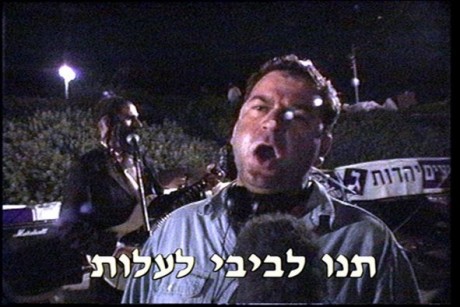
How I learned to overcome my fear and love Arik Sharon
***
RETROSPECTIVE IN MUNICH 2015
The 30th edition of the DOK.fest in Munich invites the audience to watch five of the Israeili documentary master Avi Mograbi’s films. Mograbi travels apparently from one (well deserved) homage to the other, last one was in Paris at the Jeu de Paume museum in March. The films – “August: A Moment before Eruption” (2002), “Happy Birthday, Mr. Mograbi” (1999), “How I Learned to Overcome my Fear and Love Arik Sharon” (1997), “Once I entered a Garden” (2012) and “Z32” (2008) – show the director’s personal style and his unique skill to convey his critical analysis of Israel in a humourous language.
Mograbi has been a frequent guest on this site, I am true admirer of him and his film essays, here are just two quotes:
…he innovates the documentary language by using talking masks, as his main character, the killing Israeli soldier, does not want to face the camera. Very intelligent trick that combined with his Brechtian musical element, himself singing comments to the soldier’s crime, makes the film into a universal essayistic wish for reflection… (about Z32)
…A masterclass, a master’s class, Mograbi is exactly as his films are: tense, sometimes comic, but always dealing with the embarrassing reality of the country he lives in. A frustrated artist, as he says himself, who wants to move something, raise a debate in Israel, but does not succeed, he is met with total silence, no reactions, whereas he now is an estimated artist in Western Europe! In the next issue of Cahiers du Cinema, the headline is characterising him as ”Le Grand sculpteur de notre temps”. (DocsBarcelona 2009, masterclass with Avi Mograbi). (Blogpost 20-04-2015)
***
RETROSPECTIVE IN COLOGNE 2015
Under the headline “Always The Trouble With Avi”, the Filmforum at the Museum Ludwig in Köln shows a retrospective of films by Israeli Avi Mograbi, introduced by this great text by the curator Rasha Salti:
“He is almost always in front of the camera, but the films are never about him at all; he films the commonplace, the everyday, even the prosaic – only to reveal with unsettling lucidity more profound and unseen truths about the paradoxes of contemporary Israeli society and ist occupation of Palestine. He seems to make films about making films that in reality are never made; he trumps documentary with fiction, performance with reality, back and forth, addling the codes of direct cinema. This is the trouble with Avi Mograbi’s cinematic and artistic practice: it is so essentially and literally subversive that it is impossible to classify. As is he: actor, sound recordist, second cameraman, singer, performer, director and citizen, he embodies all these roles dutifully, responsibly, without ambiguity or affect. And most remarkably, he never displaces himself or his body from the ailing social body he films, deconstructs, challenges or provokes.” The director is present at the screenings.
And this is what I wrote on this site, when Avi Mograbi was in Barcelona:
”…A masterclass, a master’s class, Mograbi is exactly as his films are: tense, sometimes comic, but always dealing with the embarrassing reality of the country he lives in. A frustrated artist, as he says himself, who wants to move something, raise a debate in Israel, but does not succeed, he is met with total silence, no reactions, whereas he now is an estimated artist in Western Europe! In the next issue of Cahiers du Cinema, the headline is characterising him as ”Le Grand sculpteur de notre temps”. (DocsBarcelona 2009, masterclass with Avi Mograbi). Check the website, fine introductions to all films. (Blogpost 05-10-2015)

Avenge But One of My Two Eyes (2005)
***
BETWEEN FENCES (2016)
Berlin Forum 2016, diary: Israeli Avi Mograbi is one of the most remarkable “auteurs” of our time. If you want to know more you are welcome to check posts made on this site on his work – since 2008, more than 30 that includes his name. Now he is there with a new film, this text is taken from his FB page:
… My new film “Between Fences” was selected to the Berlinale’s Forum! Produced by LesFilms Dici, theater facilitator and director Chen Alon, photography by Philippe Bella Bellaiche, music by Noam Enbar:
Avi Mograbi and theater director Chen Alon meet African asylum-seekers in a detention facility in the middle of the Negev desert where they are confined by the state of Israel. Together, they question the status of the refugees in Israel using ‘Theater of the Opressed’ techniques. What leads men and women to leave everything behind and go towards the unknown? Why does Israel, land of the refugees, refuse to take into consideration the situation of the exiled, thrown onto the roads by war, genocide and persecution? Can the Israelis working with the asylum seekers put themselves in the refugee’s shoes? Can their collective unconscious be conjured up? (Blogpost 20-01-2016)
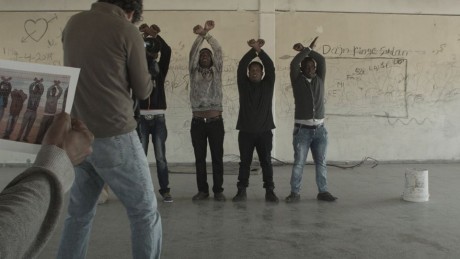
Between Fences
REVIEW
There is a lot of good mood in this new film by Avi Mograbi – as there always is in films by this great Israeli filmmaker, who in his films for decades has raised a critical voice to the way politics and human rights are dealt with in his country. They have a good time being together, the asylum- seekers from Eritrea and Sudan, who with theatre director Chen Alon, cameraman Philippe Bellaiche and Mograbi himself – doing the sound, moving around with a boomstick – perform scenes from their own lives, from where they come from and from the absurd situation they are in now. Playing the scenes, thus staging their own lives, could make them politically active as well as have them express their own frustrations and traumas. That is the philosophy.
They are near Holot, a detention centre in Israel close to the Egyptian border, they can not be sent back to their home countries, where they would be persecuted – and they can not go to Tel Aviv because the Israelis don’t want them and consider them to be ”dangerous infiltrators”, as it is stated in the synopsis of the film.
The theatre scenes in good mood, but with no optimism, are in general perfomed by a handful of detainees, in the time between the roll calls of Holot three times per day. Which makes them de facto, as they state it, live in a prison. If they are not there for the roll calls they might be transferred to Saharonim, a ”real” prison with no permission to leave.
The good mood of the theatre scenes stops with the individual talks, the monologues from some of the refugees, who tell stories of murder, torture, hunger… and about escaping into Israel from Egypt, being caught by Israeli soldiers, being sent back again, crossing the border several times. It’s crazy and humiliating and against any human right convention.
”We don’t want your country, because you don’t want us”, is one sentence. Another person talks about facing racism if you get into Tel Aviv as a black man – and when the Holot is announced to be closed, a couple of the refugees say that they will stay here anyway; there is no home to go back to, there is no future for them in Israel.
In the film Avi Mograbi is present at a strike in June 2014 by the refugees, who are confronted with Israeli military. You see him stand behind a fence having a conversation with a man inside Holot – are you fasting, he asks, are you being treated well etc. You sense the frustration by the director who, in one of the theatre scenes, regrets that he can not get into Holot to film and you have the feeling of hopelessness from not only those, who are stuck in this isolated location in the desert, but also from Mograbi himself, who with Chen Alon try to do something good but know that what they do – for very few – is a drop in an ocean of aggression and lack of humanity. As a response you can only say, like I do here, yes, but you do something, you point at an injustice, you raise your voices on behalf of people in need. And you do so through a cinematic combination of emotion and information. As a viewer you watch, listen and read the many texts on the screen, you shake your head… France/Israel, 2016, 85 mins.(Blogpost 01-03-2016)
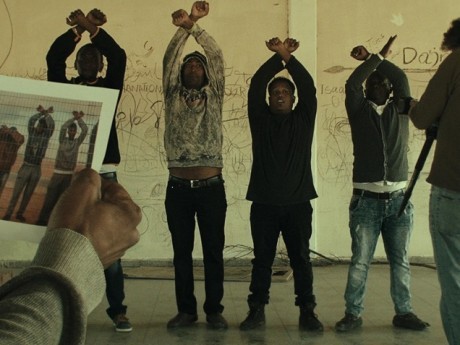
Between Fences
***
LINKS
www.avimograbi.com (Mograbi’s site)
lemonde.fr (Jacques Mandelbaum, Le Monde, review on Z32)
dafilms.com (DocAlliance, streaming of ” Once I entered a Garden”, 2013)
www.academycologne.org (Museum Ludwig in Köln retrospektive series 2015)



